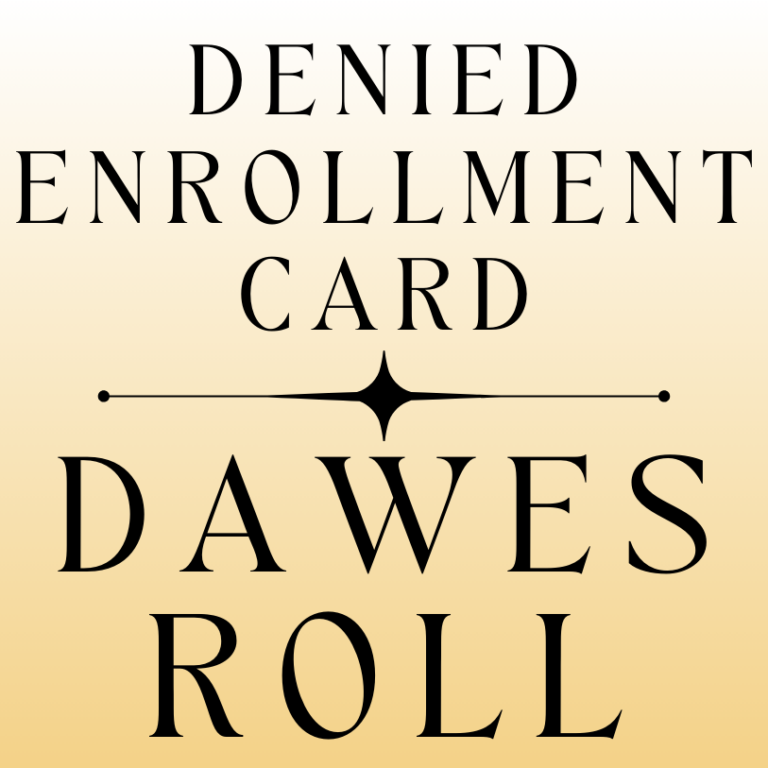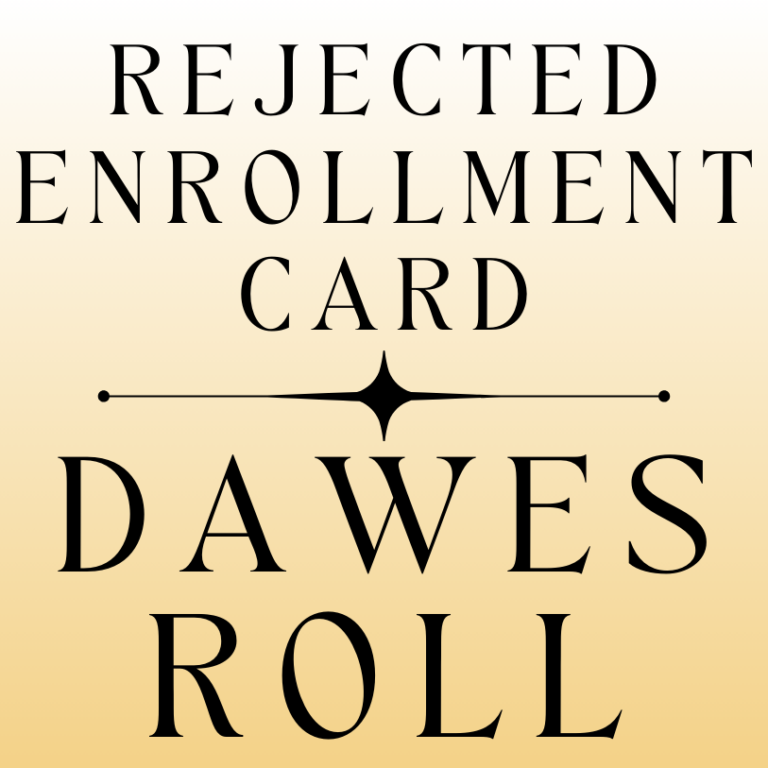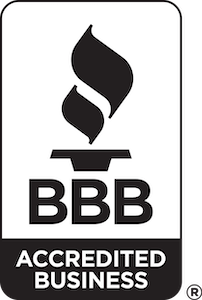Enrollment Cards
1898-1914

Accepted enrollment cards, also known as Census Cards, were the official records used by the Dawes Commission (1898–1914) to document individuals deemed eligible for enrollment in the Five Civilized Tribes—Cherokee, Choctaw, Chickasaw, Creek, and Seminole—as part of the Dawes Roll. These cards served as a summary of the applicant’s details and were used to determine eligibility for land allotments under the Dawes Act of 1887.
- The Dawes Act of 1887 sought to assimilate Native Americans into Western culture by dividing tribal lands into individual allotments.
- To manage this process, the Dawes Commission required applicants to submit proof of ancestry and tribal affiliation, leading to the creation of enrollment cards documenting each applicant’s case.
- Only those listed on accepted enrollment cards were eligible for land allotments and later recognized as tribal citizens.
Locating Enrollment Cards (Dawes Cards)
- Allen County Public Library Genealogy Center - Enrollment Cards of the Five Civilized Tribes 1896-1914
- Ancestry.com -Oklahoma and Indian Territory, U.S., Dawes Census Cards for Five Civilized Tribes, 1898-1914
- Ancestry.com - U.S., Native American Applications for Enrollment in Five Civilized Tribes, 1898-1914
- FamilySearch - Enrollment of the Five Civilized Tribes : Dawes Commission, 1896-1909
- FamilySearch - Enrollment cards for the five civilized tribes, 1898-1914
- NARA - Census Cards (Enrollment Cards)
Who It Covers:
- Tribal Members: Documented individuals belonging to one of the Five Civilized Tribes.
- Freedmen: Formerly enslaved African Americans held by tribal members and granted citizenship under the Treaties of 1866.
- Intermarried Whites: Non-Native spouses of tribal members who had been legally adopted into the tribes.
- Minor Children and Newborns: Included as dependents on family applications.
Accepted Enrollment Cards
Who Was Included?
- Tribal Members “By Blood” – Individuals with documented Native American ancestry.
- Freedmen – Former enslaved African Americans who were granted tribal membership through treaties after the Civil War (1866).
- Intermarried Whites – Non-Natives married into the tribe and granted citizenship.
- Minor Children – Children listed with their parents or guardians.
- Newborns – Added later as supplemental enrollments after initial applications.
Information Included:
- Personal Details: Full name, age, gender, and marital status.
- Family Relationships: Names of parents, spouses, and children.
- Tribal Data: Degree of Native blood quantum and tribal affiliation.
- Residency: Location within the Indian Territory.
- Application Number: Reference number linking to application jackets with additional supporting documentation (affidavits, testimonies, and legal appeals).
Significance:
- Proof of Ancestry: Forms the basis for tribal citizenship in modern times.
- Land Allotments: Provided eligibility for individual land parcels, breaking communal ownership.
- Genealogical Resource: Lists multi-generational family information, useful for tracing ancestry.
- Freedmen Records: Recognizes African American connections to Native American tribes, although Freedmen’s rights remain contested, especially in the Cherokee Nation.
Denied enrollment cards were created for individuals whose applications were rejected by the Dawes Commission due to ineligibility for enrollment in the tribes. These records include reasons for denial and supporting documents, offering valuable insights into family histories.
- The Dawes Act of 1887 aimed to assimilate Native Americans by dividing communal tribal lands into individual allotments and granting U.S. citizenship to those who accepted the parcels.
- The Dawes Commission required individuals to prove their tribal affiliation through ancestry and residency records.
- Applicants who could not meet the documentation standards were issued denied enrollment cards, barring them from land ownership and tribal benefits.

Denied Enrollment Cards
Who Was Denied?
- Insufficient Proof – Individuals who failed to provide adequate documentation of Native ancestry.
- Non-Tribal Affiliates – Applicants without established connections to the Five Civilized Tribes.
- Freedmen Without Tribal Ties – Some African Americans were rejected if they could not prove residence or association with the tribes before the Treaties of 1866.
- Migrants and Absentees – Those who had moved away or declined enrollment during previous tribal censuses.
- Mixed Ancestry Issues – Applicants who claimed ancestry but did not meet blood quantum requirements.
Information Included:
- Applicant’s Name and Personal Details: Same as accepted cards.
- Reason for Denial: Example: “Insufficient proof of Cherokee blood” or “Not residing in tribal territory.”
- Appeals and Testimonies: Details from witnesses, relatives, and neighbors attempting to verify lineage.
Significance:
- Proof of Attempted Enrollment: Even denied applications can validate claims of Native ancestry, especially if oral traditions support tribal ties.
- Rejection Details: Shows where documentation gaps existed, potentially guiding further research.
- Contested History: Reflects the controversial policies around blood quantum, citizenship, and the exclusion of Freedmen.
Key Differences between Accepted and Denied
Enrollment Cards
| Aspect | Accepted Enrollment Cards | Denied Enrollment Cards |
| Purpose | Approved for tribal enrollment and land allotments. | Rejected based on eligibility criteria. |
| Eligibility | Met ancestry, residency, and blood quantum rules. | Failed to meet proof of ancestry or residency. |
| Outcome | Eligible for citizenship and land ownership. | Denied rights to citizenship or land claims. |
| Genealogical Value | Confirmed family histories and relationships. | Provides rejection details and missing links. |
| Modern Impact | Supports claims for tribal enrollment today. | Basis for appeals or further research. |

The Rejected Roll refers to a list of individuals whose applications for tribal enrollment were not approved by the Dawes Commission (1898–1914). These applicants were not included in the final Dawes Roll, meaning they were denied tribal citizenship and the accompanying land allotments granted under the Dawes Act of 1887. Although individuals on the Rejected Roll were denied tribal citizenship and land allotments, their applications still contain valuable genealogical information, including:
- Names of ancestors and family members.
- Stated tribal affiliation (even if ultimately unproven).
- Reasons for rejection, which can provide insights into historical tribal policies.
- Residency details that may help trace family migrations.
Key Differences between Denied and Rejected
Enrollment Cards
| Feature | Denied Enrollment Cards | Rejected Enrollment Cards |
| Application Status | Fully reviewed but found ineligible | Not fully processed or dismissed early |
| Reason for Exclusion | Failed to meet Dawes Commission criteria for tribal enrollment | Incomplete, late, or suspected fraudulent applications |
| Documentation Included? | Yes, includes details on why the applicant was denied | May contain minimal or no details if rejected early |
| Possibility of Appeal? | Sometimes (if more proof could be provided) | Less likely (often due to administrative disqualification) |
| Value for Genealogists | Useful for tracing ancestry and understanding family history | Less detailed, but can provide clues about family claims |


